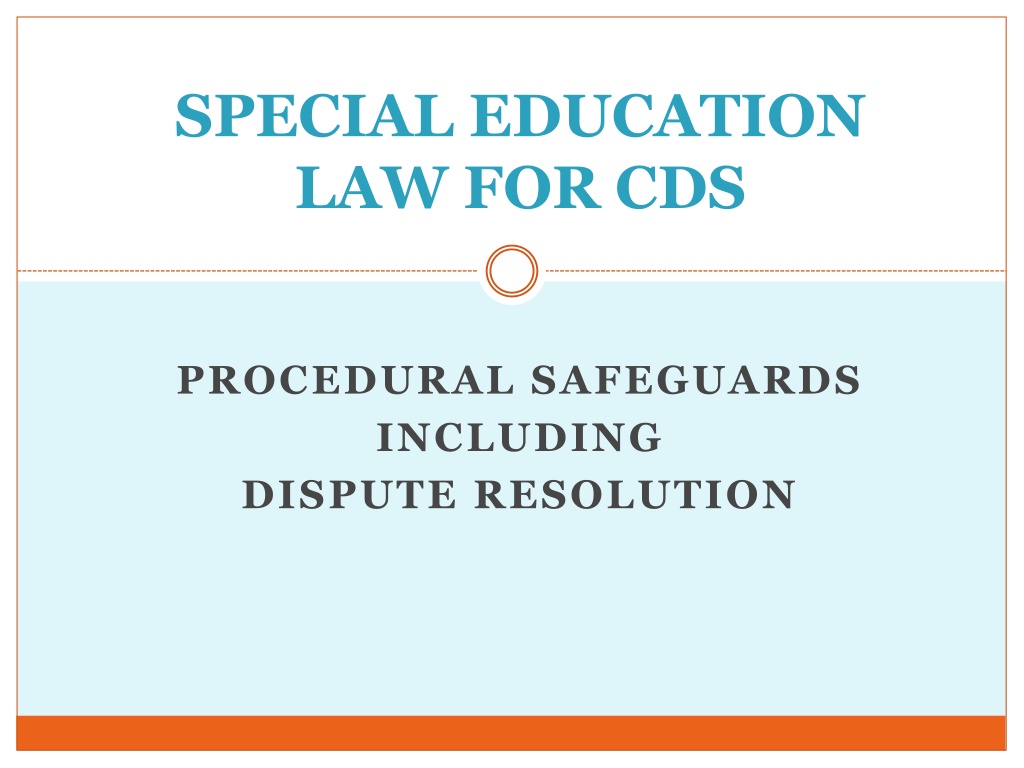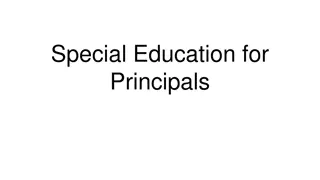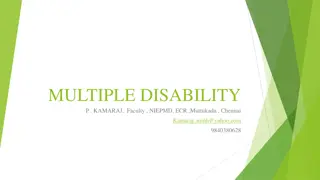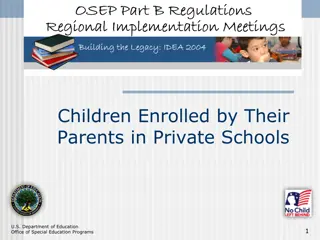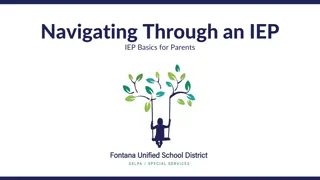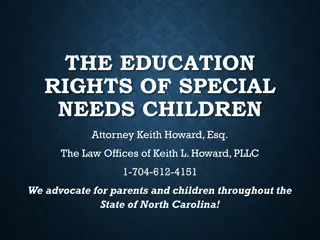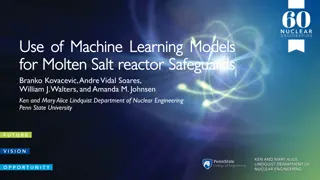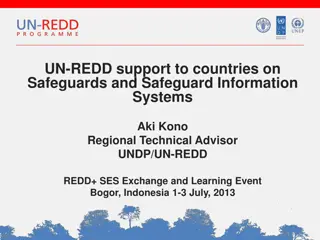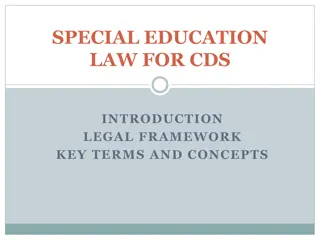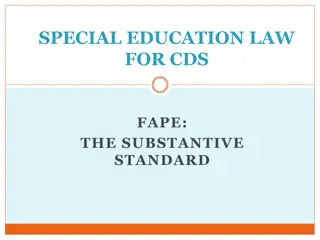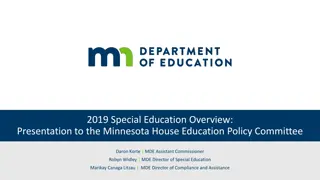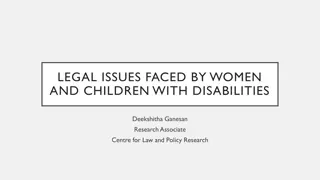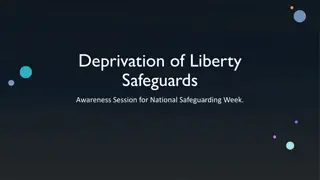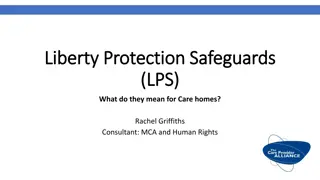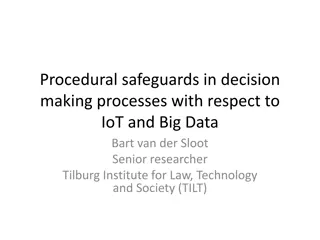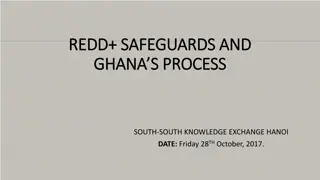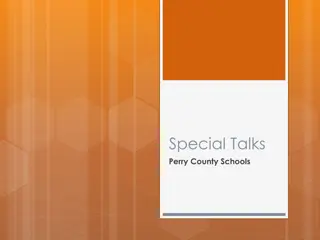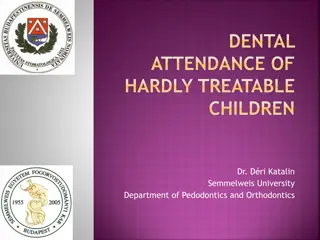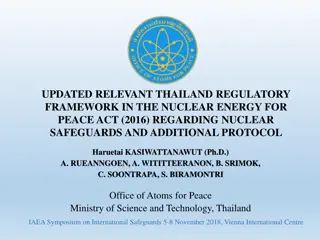Understanding Special Education Law and Procedural Safeguards for Children with Disabilities
Learn about the procedural safeguards that educational institutions must implement for children with disabilities, including the provision of annual notice, independent evaluations, parental consent, access to records, and dispute resolution options. Discover who these safeguards apply to – parents, guardians, or adult students – and the roles they play in ensuring a child's educational rights are protected.
- Special Education Law
- Procedural Safeguards
- Children with Disabilities
- Dispute Resolution
- Parental Rights
Download Presentation

Please find below an Image/Link to download the presentation.
The content on the website is provided AS IS for your information and personal use only. It may not be sold, licensed, or shared on other websites without obtaining consent from the author. Download presentation by click this link. If you encounter any issues during the download, it is possible that the publisher has removed the file from their server.
E N D
Presentation Transcript
SPECIAL EDUCATION LAW FOR CDS PROCEDURAL SAFEGUARDS INCLUDING DISPUTE RESOLUTION
Procedural Safeguards CDS must implement procedural safeguards MUSER XV CDS must provide notice of procedural safeguards Notice must be given annually, and: Initial referral/parental request for evaluation Upon receipt of first state complaint/due process hearing request In accordance with discipline procedures Upon request
Notice must contain: Independent educational evaluation Prior written notice Parental consent Access to education records Opportunity to present complaints through due process hearings and state complaint process (and the differences between them) The availability of mediation Stay put Procedures for students who are placed in an IAES
Notice must contain: Requirements for unilateral placements by parents of children in private schools at public expense Hearings on due process complaints State level appeal (if applicable, which in Maine it is not) Civil actions Attorneys fees
Procedural Safeguards Notice must be in understandable language written in language understandable to the general public 34 CFR 300.503(C) Appendix 1 to MUSER Model statement provided by USDOE
Whose safeguards? Parent(s), for students under the age of majority (18), or older students under guardianship Students, at the age of majority adult student
Parent Biological or adoptive parent A foster parent A guardian authorized to act as the child s parent, or authorized to make educational decisions for the child Person acting in place of a biological or adoptive parent with whom the child lives, or an individual who is legally responsible for the child s welfare
Parent Person appointed by a court to act as a parent Surrogate parent where no parent can be located/identified or when child is in state custody Representative of a public agency can NEVER serve as the parent of a child with a disability
Miranda Approach Right to be an informed participant in the educational discussions and decision making about your child Right to give/withhold informed consent before an evaluation or special education and related services are provided to your child Right to access and control distribution of your child s educational records/personally identifiable information Right to contest decisions made by CDS through dispute resolution processes
Informed Participant Written notice (prior written notice) of proposal or refusal regarding identification, evaluation, placement or provision of FAPE Action Basis why? Evaluation, procedure, assessment, report or record used in deciding Options considered/rejected Procedural safeguards and where to get procedural safeguards Where to turn for help with the procedural safeguards In Maine, summary of comments by parents In Maine, names/titles of each member
Informed Participant WN must be in understandable language Native language/mode of communication WN (and notice of procedural safeguards) can be by electronic mail if offered by school unit and parent chooses
Give/Withhold Consent Initial Evaluation If enrolled or seeking to enroll in public school, CDS can pursue due process if refuse or fail to respond Initial provision of special education and related services CDS cannot pursue due process if refuse or fail to respond Reevaluation Unless CDS can demonstrate that it took reasonable efforts to obtain consent and parent did not respond
Informed Consent Fully informed in native language/mode of communication of all information about the action for which parent is giving consent Understand and agree in writing to action Description of action and lists records that will be released and to whom Consent is voluntary and can be withdrawn at any time
Review/Control Access to Records Inspect and review Without unnecessary delay, before any meeting regarding the child s education With reasonable explanations/interpretations Copies if failure to provide would prevent inspection/review Representative can inspect and review Record of Access CDS must keep record of parties obtaining access to education records Amendment at parent request Including opportunity for hearing
Review/Control Access to Records Unless contained in education records and authorized to be disclosed without parental consent by FERPA, personally identifiable information cannot be disclosed to parties other than officials of participating agencies without parental consent
Due Process Mediation State Complaint Investigation Due Process Hearing
Mediation Voluntary Can be stand alone or combined with a request for a complaint investigation or due process hearing Discussions that happen during the mediation process are confidential (cannot be used in subsequent due process/court case) Mediation agreement enforceable in court
State Complaint Investigation Allegations that public agency violated IDEA/ MUSER Public agency has the opportunity to propose a resolution of the complaint Commissioner appoints complaint investigator Investigator prepares report for Commissioner; Commissioner makes final decision If violations are found, corrective action plan developed for public agency Department monitors to ensure compliance with CAP
State Complaint Investigation 60 days for Department to resolve Violation that occurred with one year If same allegations are the subject of a due process hearing, state complaint is set aside until the hearing is over hearing decision is binding.
Due Process Hearing Limited to claims relating to the identification, evaluation, placement or provision of FAPE Parties limited to parents and school units Must file a due process hearing request within 2 years of the date parent or SAU knew or should have known about the issue(s) in the request Resolution meeting required for parent complaints before hearing (30 day resolution period)
Due Process Hearing Hearing is an administrative hearing Witness under oath Evidence presented for admission 5 day rule Right to examine/cross examine Both parties have the right to be represented by counsel Hearing must take place within 45 days of end of resolution period Impartial hearing officer Commissioner appoints hearing officer but does not make final decision
Due Process Hearing Hearing officer s decisions can be appealed to federal or state court 90 days to file an appeal Can file a state complaint alleging failure to comply with a due process hearing decision
Placement Issues Stay put: During any of the three forms of due process, the student must stay in their then-current or last agreed upon educational placement Discipline/manifestation determination Interim Alternative Educational Setting Unilateral parental placements Must have previously received special education Must notify CDS at the most recent IEP Team meeting or 10 business days before
Remedies Tuition reimbursement Cost of unilateral placement when public agency has failed to provide a FAPE in the LRE Burlington School Committee and Florence County decisions reimbursement for private placements Parent who unilaterally places risks footing the bill Parent who prevails may be entitled to reimbursement of private school tuition/expenses Private schools do not have to be approved by the State in order to receive tuition reimbursement Private school must provide what was lacking in public placement
Remedies Compensatory education CDS provides services to make up for violation of FAPE Equitable remedy no requirement that compensatory education be hour for hour . . . Issue is whether the amount is sufficient to make up for what was lost: could be less, could be more.
Remedies Attorneys fees Prevailing parents In part or in whole Prevailing school units where litigation is frivolous, brought for an improper purpose, continued to litigate once it became frivolous, etc. School units will have a tough time collecting fees! Not expenses like expert witnesses
The misfit Independent Educational Evaluation (IEE) Must have had a public evaluation Request an IEE Within 30 days. CDS can either agree to pay for it, or seek due process to determine that their evaluation was appropriate Evaluation must be conducted under the same terms (location, qualifications) as a public evaluation
#FAPEcats final secret code CongratulationsFAPEnationyoufinished!
